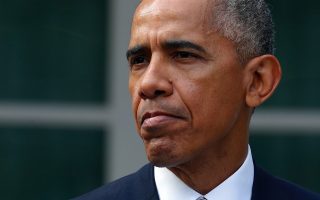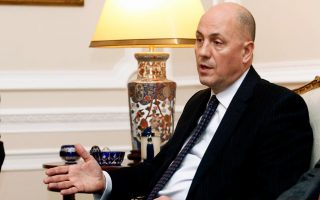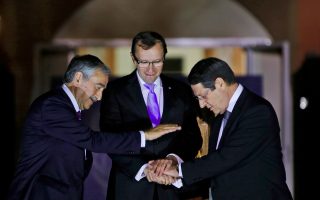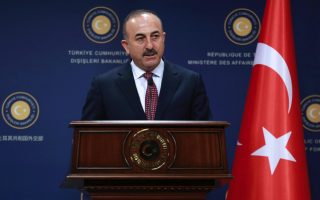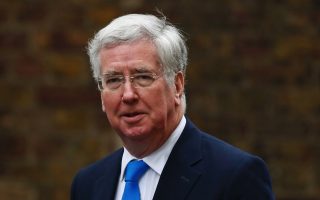Geoffrey Pyatt: Greece-USA cooperation closest it has been for a long time
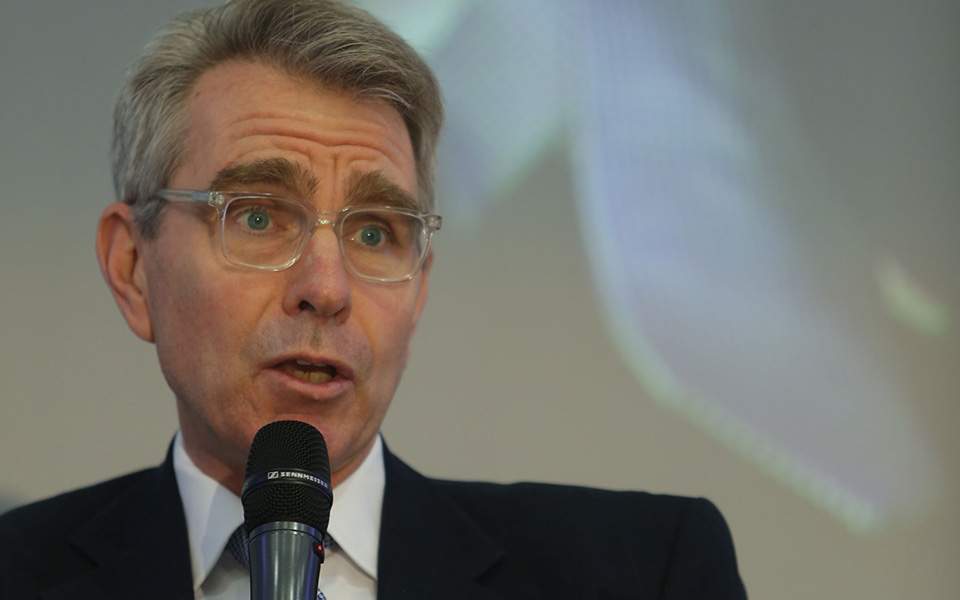
Greece and the United States are currently enjoying the closest cooperation they have had in the last few decades, US Ambassador in Athens Geoffrey Pyatt told Kathimerini in an interview. Pyatt described Greece as a pillar of stability in a region that is facing a series of challenges, including the economic crisis, refugees flows and terrorism.
How do you assess US President Barack Obama’s visit to Athens?
Let me just start by saying, I think it was very exciting for everybody at the Mission, the whole team, to be part of what was, clearly, a historic visit. A visit that set a new high-water mark in terms of our bilateral engagement, in terms of our partnership. I think President Obama was very gratified by the reception he received and, not just the strong partnership with Prime Minister Alexis Tsipras, but what he heard across the board.
The single most important message of the visit, I think you heard in the speech at the Niarchos Center, [is] that the United States is committed to supporting Greece; that the United States is invested in seeing a successful Greece, which overcomes the economic crisis, which is not left alone to deal with the migration crisis, and which consolidates its role as a key NATO ally and a pillar of stability in a very challenging region.
So, I think I was struck, as the fly on the wall in a lot of the conversations between the leaders, by both the degree of candor – I mean this is a very, very comfortable relationship for both sides and I have seen a lot of these leader-level encounters – but also by the clear understanding that we are at a moment where there is a great deal that we can do together – both in the short term – the debt issue for instance – but also in the longer term. How we continue to work together in NATO; how we think about the growth of our trade and investment relationship – which is one of the issues where I would like to be able to make some progress over the next couple of years; how we think about the next generation. There was a considered decision to skew the audience at the Niarchos Center towards young people. And I think that reflects both this president’s bias but also our judgment. So that was part of it. I think another aspect that I’d like to highlight – one of the things that struck me in my first two months in Greece – is there’s a lot more to be hopeful about here than often comes through in the conventional conversation in Washington or New York and, I would guess, in Berlin and Brussels as well.
I was very glad that we were able to have this event with the Hellenic Initiative focused on entrepreneurship. We had about 40 young startups, all of whom are smart, they’re entrepreneurial, they are creating value in a Greek economy that hasn’t had a lot to be enthusiastic about in recent years. And I think the visit was very important for Greece from that perspective in terms of setting a positive narrative. In his interview with Kathimerini, President Obama had said Greece needs hope or Greeks need hope. And I think that’s one of the things that the visit certainly helped to accomplish globally, in the United States, part of the message back home, and something that I think all of us at the embassy are now committed to building on.
And of course psychology has a big effect on the economy, so hope can also lead to more positive, growth-oriented developments in the Greek economy.
Markets are certainly about psychology. So, obviously, it’s a huge honor to be able to host one of these visits any time. But, I think in particular, to do so as part of President Obama’s final international trip, for my embassy team to be part of that. I think all of us who were involved realized that we were watching a little bit of history unfold. And, I think very important for Greece as well, that the president chose to come to Greece at this time, to deliver his valedictory address to the world from Athens, from the birthplace of our democratic values, and to speak the way he did in defense of democratic principles and democratic governance.
I think one of the principles I felt very strongly about is the idea that we cannot take for granted our democratic values. We need an assertive effort by the West, by the USA, by our key international partners, to stand up for those values.
Are these values threatened in the West?
They’re being challenged for the reasons the president talked about in his speech at the Niarchos Center: globalization; the sense of people feeling like they don’t have control of their futures in the way they once did; the whole phenomenon of social media – I was fascinated to see President Obama talking about that as well – we’re sort of bombarded with both information and misinformation, but also the single biggest change that’s happened in the business that I’m in. I mean, I look back on my now 27 years of Foreign Service career. The biggest single change that’s happened is right there [points] – an iPhone. It’s the instantaneous, global availability of information. So that some Afghan sitting in a dusty village somewhere is able to look and say: “Hey, look how they’re living in Europe. I want to be part of that. I’ve got some cousin who made his way to Hamburg. I need to pick up and move.” And that, I think the idea of having this sort of instantaneous, global availability of information has produced a dramatic change.
How do you view the phenomenon of misinformation in the modern age?
Truth is fungible. You know, I lived through this for three years in Ukraine where you had the weaponization of information. And I always made the point in that context that when the Kremlin threw up some false narrative, it wasn’t to win an argument, it was as part of creating doubt. And I think that’s the challenge because we’re used to thinking of fact as grounded in reality and something that you can scientifically find through debate and elimination. Suddenly that’s not so easy.
How important is the role of Greece in the region, given all that you just said, geostrategically?
Very. First, and most importantly, it’s a longstanding NATO ally, longstanding member of the European Union, a pillar of stability, democratic values in a region that is facing challenges. Souda Bay is an important part of that, as President Obama discussed while he was here. One of the very first things I did after coming to Greece was fly down to Souda to meet with our sailors there, understand concretely how we are working with our Greek counterparts. And I came away very impressed by the quality of the professional interaction between the US airmen and sailors and marines at Souda and their Greek counterparts.
So, that’s a relationship that will be of enduring importance at the strategic level. The point that I would make is, first of all, that the United States needs a successful Greece, for all the reasons I just talked about, but also because we are interested in having a successful Europe. And I think, despite all the rhetoric of the campaign and everything else, eventually the stable core of American foreign policy for many decades now has been our transatlantic relationships. It is that pillar, that foundation, that allows us to do everything else that we do together around the world. And I don’t anticipate that will change.
In that context, in that larger European context and, again, I’ve lived this up close and personal for three years in Kiev as well, it is our unity that serves us best; it is our agreement on principles and values that serves us best. And the viability, the vitality of the European project is challenged today by two issues that come right through the middle of Athens: One is the migrant challenge, and an issue that has to be dealt with collectively as President Obama emphasized while he was here, it can’t be on the shoulders of two or three countries – Greece, Germany, Italy, Sweden; and the other is the economic challenge, how to restore and accelerate growth, and this is an issue.
I think one of the hopeful things that I find arriving in Greece is the sense that the economic narrative here has begun to turn upwards. But, Europe writ large is clearly not out of the woods and you only have to look across the sea to Italy to see the kind of challenges and stresses that continue to be part of the economic story here. So I think a strong and vibrant Europe, which is important to the United States, depends on a strong and vibrant Greece. And so that’s why the investment we make in our relationship here is so important.
What about the angle of terrorism (ISIS etc)? Given Greece’s geographic proximity, how important is the cooperation with the Greece on that level, too?
As you know, my military colleagues, they love PowerPoint. And they love Venn diagrams. And I always talk about a three circle Venn diagram that has, in one circle, North Africa and the Maghreb, in another circle the Eastern Mediterranean, Syria, and then, in a third circle, the Black Sea region, a more aggressive and expansive Russia. The place where that Venn diagram comes together is in Greece. So, that sort of strategic element of the relationship will remain important.
Right now, the most challenging of those three circles is the one that overlays Syria. The thread of transnational terrorism is a key manifestation of that. Also the consequences for Greece from continued humanitarian catastrophe in Syria, in terms of refugee flows.
On those issues the good news is that we have an outstanding counterterrorism relationship here. I’ve been really impressed as I’ve started work and also in my briefings back in Washington – FBI, Homeland Security, Department of State. There’s first a very high level of professionalism in the relationship but a high level of candor. We took that another step forward week before last with the signature of this document, this awful acronym that we signed, the document that we signed with the Hellenic Police for a secure real-time platform which, in plain English, means a software which allows for the rapid and real-time exchange of information between our countries about individuals who may be a threat.
A window of opportunity for Cyprus
An unexpectedly close cooperation given the ideological overtone of the present Greek government.
I think it’s more comfortable than it has been in a long time, and I think with a clear sense, a clear understanding on both sides, that our interests are served by a high degree of collaboration and the kind of transparency and partnership that is befitting of our alliance.
Has Turkish President [Recep Tayyip] Erdogan gone too far internally, with respect to human rights, freedom of the press, freedoms in general – also externally?
I don’t want to make Ambassador [John] Bass’s job any harder than it is so, I think on questions of Turkish domestic policy and performance, I will leave it with him.
What I will say is I have been very impressed by my conversations with Foreign Minister [Nikos] Kotzias, Director General [of National Defence Policy and International Relations Tryphon] Paraskevopoulos, and other Greek government officials in terms of the real sophistication that they are bringing to the management of Greek relations with Ankara, and the very clear understanding that Greece is interested in a Turkey which is democratic, stable, anchored in European values and European institutions.
President Erdogan has made a few comments on the Lausanne Treaty which go beyond the mark, although there is a domestic angle, but, how do you assess his statement saying that things can change, borders can change.
So, a couple things. And, again, I saw your interview with Foreign Minister Kotzias when I was looking for the Foreign Ministry statement today because they did put one out, no surprise there. President Obama also talked about this issue in his interview with Alexis Papachelas. So, I think I’ll stick to where my president was on this issue in emphasizing our view. First of all, these are two countries which are NATO allies, two countries which have a great deal to gain from cooperation with each other. My favorite example, because it’s an issue of high priority to me, is the Trans Adriatic Pipeline (TAP). All of these energy issues have an obvious regional component which benefits from a stable, mature interaction.
But I think what the president said to Papachelas is the most important, which is that Europe reflects – Europe today and the economic accomplishments of Europe over the past several decades – the enormous gains that have come to the people of Europe from a policy that has shifted from hostility and territorial disputes to shared interests, shared value, and expanding economic opportunity. As the president said to Papachelas, I think that same set of ideas applies and is relevant to these conversations about relations between Greece and Turkey.
Do you see prospects for a solution on Cyprus?
I’ve been very impressed by the quality of the dialogue between our two governments, between Washington and Athens, on the Cyprus problem. I’ve also been gratified by the sophisticated approach of the key Greek government players on this issue, starting with Prime Minister Tsipras. You saw both President Obama and Prime Minister Tsipras talk a lot about Cyprus in their press interactions. That may be the longest statement by any US president on Cyprus issues in decades. And there is a very, very intense and frank conversation between our two capitals on these issues. We clearly see a window of opportunity that is open right now because you have two leaders on the island, and [Turkish-Cypriot leader Mustafa] Akinci and [Cyprus President Nicos] Anastasiades who are committed to achieving a settlement.
I was very encouraged, and it was important what Prime Minister Tsipras said after, in his press conference when Anastasiades was here. The prime minister made very clear his commitment to supporting risks that may be taken by the Greek-Cypriot leadership as part of a peace process. The nature of diplomacy and, especially, conflict diplomacy negotiations, is nobody gets 100 percent of what they want. There have to be compromises. I think what distinguishes the current moment in Cyprus is that you have two leaders, on both sides of the conflict, who appear ready to take some risks. Ultimately, this is a conflict that has to be solved by the Cypriot people themselves. It has to be solved in terms that will pass muster with their democratic politics. But I think it’s clearly in the interest of the Cypriots to see this conflict settled. I think it’s clearly in the interests of Greece to see this conflict settled. And I think it’s in the interests of Turkey.
Why?
Because it does two things. One, it opens economic opportunities, particularly on the energy side, but more broadly [too]. And I think one of the analysts at the Atlantic Council made the point that having an EU member-state which has a significant Muslim, Turkish Muslim minority, as a unified, bizonal, bicommunal federation, that’s a very positive step in a region that hasn’t seen so many positive narratives recently.
Last point on Cyprus. I’m trying to be as objective, but I find it strange that there can be a solution with a European member having foreign troops remaining on its soil, which is what Turkey is pushing for.
I want to be extremely careful on this, because I’m not one of the negotiators. There’s a negotiation going on right now and we see that this process is very much alive still from a US standpoint. I think it’s better at this point not to prejudice what the end state looks like. And give the leaders the space they need to seize this opportunity to solve a decades-old conflict.
On the energy situation. Is the US interested in bringing US shale gas to Europe through Greece? And what about the TAP project?
First of all, on energy, this is a set of issues that I’ve thought about and worked on a lot over the past couple of years. I think the good news is that the market forces are heading in a direction that favors importing countries like Greece. The fact that the United States has emerged as a major LNG exporter; the fact that all the predictions show that LNG will be an increasingly significant part of global gas consumption; the fact that there are EU standards which push everybody in the European energy community to move towards standards of openness, unbundling, open access, which allow market forces to prevail. All of that will work in Greece’s favor in the years to come.
Second, obviously, a key variable here is Russia and the role that Gazprom has played and the Kremlin’s use of Gazprom and energy politics as a lever to exercise strategic influence over key European states. Our policy – US policy has been very clear – is that we favor steps which allow the countries of Europe to diversify energy sourcing so that Gazprom is just one other supplier and is not able to weaponize energy in the way that it has in the past. The good news is that there are countries that have made dramatic progress in that direction.
Greece is sort of right on the cusp in this regard and it’s an issue that I will remain strongly focused on over my three years here because you have the possibility to be a key regional energy hub – both because of your easy access for LNG, which should be ultimately destined not just to Greece but to the whole Balkan peninsula, where you have a series of countries which are 100 percent dependent on Gazprom today; but also because of TAP which is, let us remember, first of all, it’s a real project unlike Nord Stream II and some of these other pipes which we don’t like, TAP is really happening. You can see the pipe being laid and the construction under way. It is the first new infrastructure for energy anywhere in Europe, specifically constructed to carry non-Russian gas. So it represents a key contribution to that goal of energy diversification that I talked about. And it generates employment and income for Greece.
What about Turkish Stream, which Russian President Vladimir Putin and Erdogan are talking about?
You know, the other thing I’ve learned working on these issues over the past few years is there are lots of conferences and press releases. There’s relatively little moving of dirt. And that’s what’s so important about TAP – it’s a real thing. On all these other pipelines we’ve made very clear our strong opposition, as the United States government, to Nord Stream II. We believe it would have the effect of reinforcing that market power. We also have made clear, as regards Turkish Stream, that we see no market justification for a second pipe which is what it would take if Turkish Stream is going to deliver gas, not just to Turkey but beyond in to Europe.
Could it go through TAP?
We’ll see. But TAP is real. It’s going to be delivering gas. And this whole question, you’ve got a whole swath of the Balkans that has yet to be brought in to the regional gas grid, so that will happen. And I was very impressed, I really had a good first visit to Thessaloniki, met a lot of really smart people there. And, again, the Turkey issue looks totally different from Thessaloniki than it does from here in some ways.
And as for the energy that’s coming in from the US, are we talking about big quantities?
We’ll see…
There’s also the East Med, possibly from Israel, from Egypt. There’s also the possibility of a pipeline to Turkey. But to get back to the US, could Greece get American gas?
There’s no legal reason why it couldn’t. Ultimately these things are going to be determined by the markets and prices and the cost to transport gas. But the important point is the one I made at the beginning – that, because Greece is an importer, you benefit and markets are global and commodities are traded. You benefit from a market that obeys European rules, that has maximum levels of competition, and, most importantly for me, maximum levels of transparency to avoid the kind of manipulation that has been a characteristic of Gazprom’s approach to these issues.
And US investment interest? What can the US do to help the Greek economy?
We are interested in helping the Greek economy. We are interested in your economic success. Investors are interested in making money. Our companies want to go where there’s transparency, level playing field, predictable tax policy, all of that. There is progress and there are huge opportunities here.
That’s true.
Fantastic resources, extraordinary human capital. If you ask me what’s impressed me most about Greece in two months, it’s the people. The capacity, the ingenuity, the resilience. I’m committed to using the platform that I have at the embassy to try to both lift up that story but also empower that new generation of entrepreneurs.
You know, I think we’ve gotten a very clear message from Prime Minister Tsipras in terms of his interest in attracting more American investment. It was a very positive move to have a new economy minister named. [Dimitris] Papadimitriou is somebody who obviously knows the United States extremely well. Prime Minister Tsipras, in introducing him to President Obama, made the point that he is the “Minister for Growth.” That, because there is this sense that the Greek economy is starting to turn the corner, there is now an opportunity to really think about, not just crisis, not how do you manage the crash landing, but how do you design the takeoff.
What would an American investor like to see in order to come and invest?
I’ll tell you what I hear from them most. First is predictability and second is deregulation. And there are, again, there are key opportunities coming up. All these privatizations – whether it’s some of the gas infrastructure, some of the ports, these are all opportunities to catalyze new investment and to create success stories. I think it was very important that the energy and environment minister sent the signal he did up with the gold mine and I think sending a signal to markets that this is a government which is not only interested in attracting investment but understands what investors are looking for.
Again, the sense I have is that we are at the moment when this narrative has started to turn around. And that’s what the United States wants to help sustain and support. We’ve got to tackle the debt issue. That’s an obvious factor. But, in my experience, it’s not the principle impediment to expanding investment at this point.
